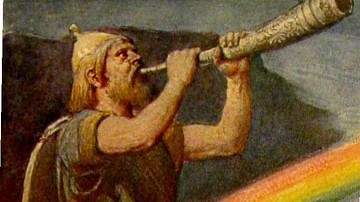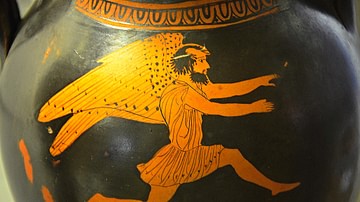Search Definitions
Browse Content (p. 107)

Definition
Pequot War
The Pequot War (1636-1638) was a conflict between the Native American Pequot tribe and the English immigrants who had established settlements in New England between 1620-1630. The immediate cause of the war was the murder of two English traders...

Definition
Heimdall
Heimdall is a mysterious deity of Norse mythology whose main attribute refers to guarding the realm of the gods, Asgard, from his high fortress called Himinbjörg found at the top of Bifröst, the rainbow bridge. He has the might of sea and...

Definition
Saint Peter
Saint Peter the Apostle was a well-known figure in early Christianity. Although there is no information on the life of Peter outside the Bible, in the Christian tradition, he is often depicted as the first on many occasions: the first to...

Definition
Wampanoag Confederacy
The Wampanoag Confederacy was a coalition of over 30 Algonquian-speaking Native American tribes who lived in the region of modern-day New England, specifically from Rhode Island down through Massachusetts and parts of Connecticut. They are...

Definition
Hyperborea
In Greek mythology, Hyperborea was the land located to the far north of the known world and it was so remote it was considered even beyond the North Wind. There a legendary race known as the Hyperboreans lived and worshipped the sun god Apollo...

Definition
Roman Legionary
The Roman legionary was a well-trained and disciplined foot soldier, fighting as part of a professional well-organized unit, the legion (Latin: legio), established by the Marian Reforms. While major tactical changes appeared during the final...

Definition
John the Baptist
John the Baptist (d. c. 30 CE) was a 1st-century CE itinerant preacher in Judea. We do not know his full name, but he is recognized by his activity. 'Baptizer' (Greek: baptizo) was translated directly into English and meant 'to immerse' or...

Definition
Oppidum - The Hilltop Fort of the Celts
Celtic hilltop forts, often called oppida (sing. oppidum), after the Latin name given to larger settlements by the Romans, were built across Europe during the 2nd and 1st century BCE. Surrounded by a fortification wall and sometimes with...

Definition
Valentine's Day
Saint Valentine’s Day, or simply Valentine’s Day, is celebrated on the 14th of February, almost internationally but primarily in western societies. It is a commemorative Christian feast for some but a secular occasion for others who see it...

Definition
Henricus Colony of Virginia
Henricus (1611-1622, also known as Henrico, Henryco, Citie of Henryco) was a colony established in Virginia in 1611 by Sir Thomas Dale (l. c. 1560-1619). Dale had been ordered by the Virginia Company of London – which had funded the establishment...